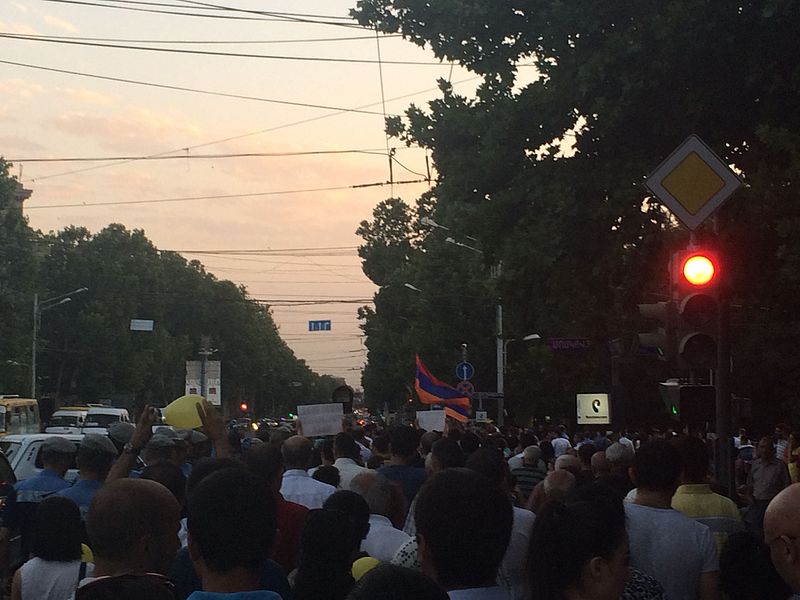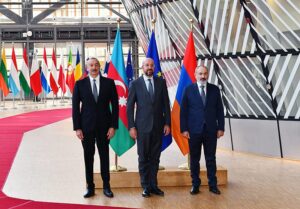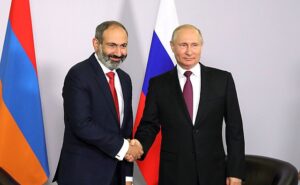For a fourth consecutive day protesters in Yerevan, Armenia, blocked streets in the city center to protest the nomination of President Serzh Sargsyan as candidate for the post of Prime Minister. The opposition and other critics say the move is intended for Sargsyan to remain in power. The crowd seems to be growing.
Switching places
The protests were triggered by speculations that President Serzh Sargsyan would be nominated as the next Prime Minister once his second and final presidential term ends in April, despite his earlier pledge not to seek the PM’s post. The rumours were confirmed on April 14th, when his ruling Republican Party indeed nominated him as its candidate for PM, its absolute majority in parliament guaranteeing his election. What makes the move more objectionable for opposition and other critics, is that Armenia is at the same time set to conclude a process of switching to a parliamentary system of government, after a constitutional referendum in 2015, which will transfer many crucial powers from the President to the Prime Minister. Sargsyan’s switch would thus ensure his continued grip on power. As it became more and more clear that this is indeed what would happen, protests erupted on the evening of April 13th.
A blocked city
One of the initiators of the protests on April 13th was Nikol Pashinian, the vocal leader of the opposition Civil Contract party, who had been on a walking tour across the country since April 2nd to rile up support for regime change in Armenia. The trigger for the protest was the news that the ruling Republican Party (HHK) will formally announce Serzh Sargsyan as its candidate for the post of Prime Minister the next day, thus confirming rumours and speculations that had been going around since the constitutional change.
Pashinian and some dozens of his supporters returned to Yerevan and joined students of the Yerevan State University who had been already staging a strike that day. The group then marched to the city’s central Liberty Square, where some thousands of people were gathering. Addressing the growing crowd, Pashinian announced round-the-clock protests against Sargsyan’s candidacy, calling on all opposition forces to join the rally. He then led the protesters through central streets to another central square, in effect paralysing the city center. The protesters have since barricaded more central streets. Police and special forces have attempted to stop the marchers, but have largely failed, declining – so far – to use direct force. An exception was an attack on protesting students by unidentified men in civilian, who were quickly dubbed ‘Titushki’ by the protesters – a reference to the pro-Yanukovich thugs hired during the Euromaidan. Pashinian has stressed the peaceful nature of the protests, calling on the protesters to not use any violence, even in reaction to police violence.
On April 15th Pashinian called on the protesters to start a civil disobedience campaign and block all major bridges and streets in the city, as well as the subway. With a swelling crowd of protesters, all major streets in the city indeed seem to be effectively blocked. On April 16th Pashinian and a group of his followers briefly occupied the offices of the Public Radio Broadcaster, demanding live airtime. The action seemed spontaneous, as the group were just walking past the building. Two policemen guarding the building drew their firearms but did not shoot, and were pushed aside. Pashinian was refused airtime, and left when power was cut to the building. The Prosecutor General’s office is looking into launching a motion related to the incident.
Apart from some attempts to stop marching protesters, law enforcement has largely kept its distance, although an extensive police cordon has been placed on the street leading up to Sargsyan’s private residence – formerly the presidential palace – and government buildings, as well as the parliament.
A parliament vote in trouble
Pashinian has said the protesters’ main objective is to stop a parliament vote set for Tuesday April 17th, during which HHK is set to nominate Sargsyan for Prime Minister. The protesters have said they will block the parliament building as well as the houses of ruling party MPs in order to stop that from happening. Rumours have been abound that the parliament session will be moved to a different location. Pashinian has said that if that happens, they will ‘take over the city.’ Reports are coming in of similar protests erupting in the second and third cities of Armenia, – Gyumri and Vanadzor. As of this writing, Pashinian had just announced that as an MP, he and others would start walking to ‘work’, meaning the parliament, in what is assumed to be an announcement of a march towards the heavily guarded parliament building.
Dialogue, arrests and resignation
After a week of mass protests, Sarkisian agreed to meet with Pashinyan on April 22nd. In a hotel near Yerevan’s central Republic Square the two men briefly met for a tense conversation. Pashinyan stuck to the core of his message: he was there to negotiate about Sargsyan’s resignation. The PM slammed the opposition leader by calling out that he didn’t have the legitimacy to talk on behalf of the people ‘’a faction that only got 7 or 8 percent of the vote [in the past elections]has no right to claim to speak on behalf of the people’’. Sarkisian subsequently walked out of the meeting, telling the journalist that they could draw their own conclusions.
About 1.5 hours later Pashinyan was arrested along with two other opposition leaders. Many observers signaled a shift in the government’s attitude towards the demonstrations. However on April 23 the situation was put upside down. Pashinyan was released from detention and less than an hour later Sarkisian suddenly published a declaration in which he announced his resignation. ‘’Nikol Pashinian was right. I got it wrong. The situation has several possible solutions , but I will not take any of them . That is not my way. I am leaving office of the country’s leader, of prime minister.’’
Following this announcement celebrations erupted in the streets in Yerevan and other Armenian cities. Deputy PM Tigran Karapetyan assumed interim leadership over government, and talks were set between him and Pashinyan for Wednesday April 25th, at 11:00. The parliament is to nominate a new PM within a week, and Pashinyan has called for early elections as soon as possible after that.



